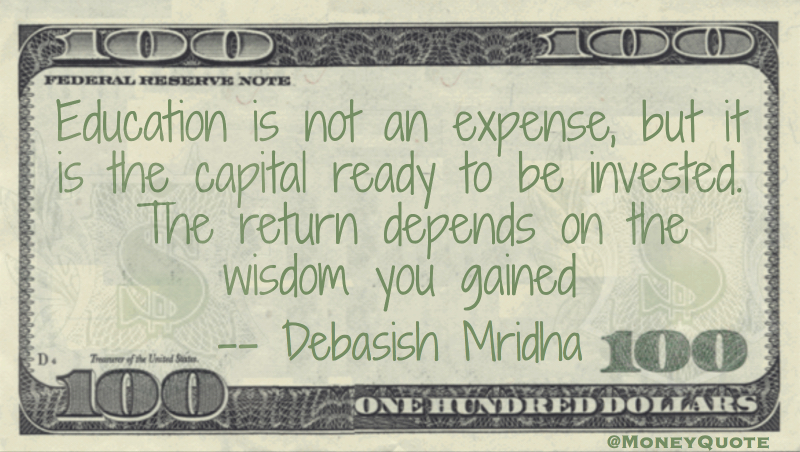Posts Tagged ‘debasish mridha’
Debasish Mridha: Capital To Be Invested
on Monday, March 26, 2018Debasish Mridha Money Quote saying We often see cost of education as an expense, but it is really an investment toward wisdom in teaching us to properly think. Debasish Mridha said:

“Education is not an expense, but it is the capital ready to be invested. The return depends on the wisdom you gained” — Debasish Mridha
The quote by Debasish Mridha is emphasizing that education should not be viewed as a mere expense, but rather as an investment in one’s knowledge and skills that can yield returns.
It suggests that the money spent on education is like capital or money invested, with the potential to generate value or benefits depending on how wisely one applies what they have learned.
The quote reinforces the idea that education pays off and is worthwhile, but the specific returns or advantages gained are determined by the insight and good judgment with which a person uses their education in their life and career going forward.
Debasish Mridha: Spend Love, Get Money
on Wednesday, June 28, 2017Debasish Mridha Money Quote saying spending love may bring lots of cash in exchange for that outpouring of good energy. Debasish Mridha said:

“You may not be able to buy love with money, but if you spend your love, you may end up with a lot of money” — Debasish Mridha
In this quote, Debasish Mridha is suggesting that while money cannot directly purchase love or strong relationships, fully devoting oneself to loved ones through generous acts of service, care and sacrifice can indirectly result in financial rewards.
By stating one may accumulate “a lot of money” if they “spend their love”, Mridha implies that selflessly investing in family, community and others through compassionate actions lays the foundation for reciprocated support during life’s difficulties that translates into tangible aid when most needed.
The interpretation is that Mridha views a life of giving love as sowing the seeds for a bountiful harvest of goodwill that enriches one’s later years not just emotionally but also materially through the assistance of those whose lives were touched.
Mridha’s perspective conveys that devoting oneself wholeheartedly to bettering others cultivates reserves of social capital that bolster livelihoods over the long run through mutual aid networks of caring people.
